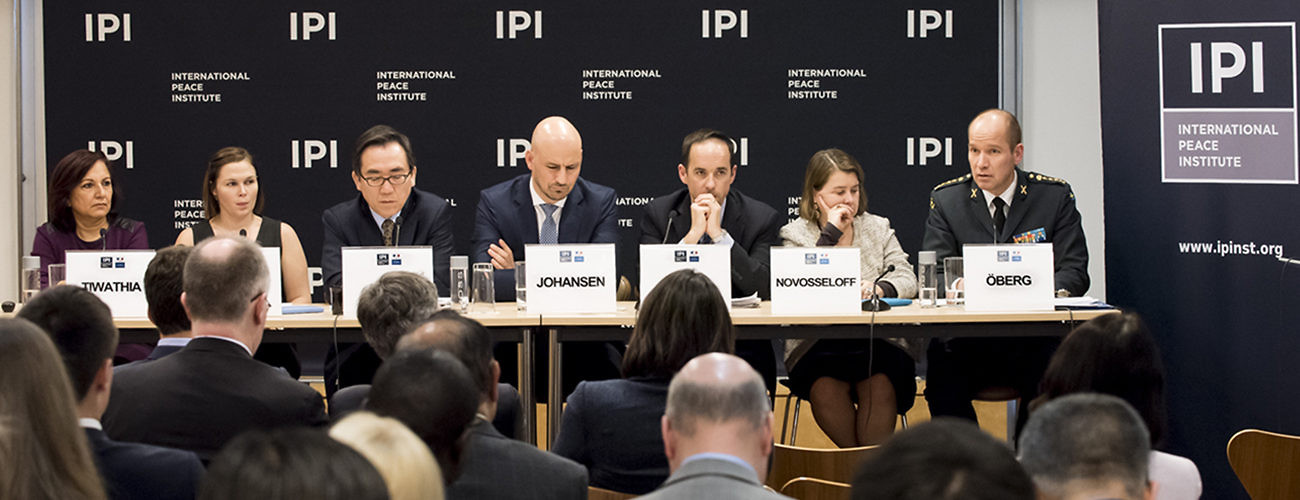The ability of the United Nations to successfully reform itself and deliver on promises to sustain peace will ultimately depend not only on the primacy of politics but also on effective management of and support to a full spectrum of peace operations in the field. This was the view shared by experts and practitioners at a recent IPI Seminar on UN Field Support for Peace Operations, opened by Olivier Landour, from the Directorate general for International Relations and Strategy (DGRIS) of the French Ministry of Defense, and Atul Khare, Under-Secretary-General for Field Support at the United Nations.
There is broad consensus that the UN currently has a unique window of opportunity to undertake reforms, and that the new Secretary-General is committed to moving towards greater decentralization, simplification, flexibility, transparency, and accountability. Participants from across the Secretariat, UN member-states’ missions, and academia convened for a closed-door discussion (under the Chatham House rule of non-attribution) on the nature of the challenges faced and the objectives reforms should aim at, and to suggest what steps could be taken to ensure UN field support becomes better “fit for purpose.”
In introducing the seminar, Arthur Boutellis, Director of IPI’s Center for Peace Operations, noted that the 2015 High Level Independent Panel on Peace Operations (HIPPO) had stressed the need for more agile field support. “The HIPPO Report pointed to the fact that mission requirements are still treated as exceptions to headquarters-focused policies, even though field missions account for over 80 % of UN Secretariat spending, 55 % of its staff, and 90 % of its procurement,” he said. He also quoted Secretary-General António Guterres saying that “the United Nations needs to be nimble, efficient and effective. It must focus more on delivery and less on process; more on people and less on bureaucracy.”
The four sessions of this day-long seminar delved further into specific aspects of field support, starting with a session framing the “broader picture” by asking the question, “What does UN field support fit for purposes look like?” This was followed by sessions on human resources and staffing, UN field support to African Union and other non-UN operations, and the role of key enablers such as medical, engineering, and aviation capabilities.
The ambassadors from Canada, the United States, Norway, Ethiopia, the Republic of Korea, and France guided the conversations throughout the day. Fabrizio Hochschild, Assistant Secretary-General for Strategic Coordination in the Executive Office of the Secretary-General (EOSG) delivered a lunchtime keynote speech highlighting how effective leadership and field support are two of the most needed resources in field missions.
A consistent theme to emerge from these discussions was the need to learn from past attempts to reform the UN system, many of which were undertaken in response to concerns regarding issues such as recruitment, terms of service, and collaborative delivery. In particular, more than one speaker emphasized that the UN is ultimately a political body comprised of member-states, whose cooperation is as essential to the adoption and implementation of reform as that of Secretariat and field staff. Accordingly, the Secretary-General and senior UN staff can play a key role in generating and presenting options for reform that can align the interests of states, UN staff, and the individuals and communities that field missions are intended to serve.
Participants endorsed the idea that field support needs to be accountable for outcomes, rather than exclusively for compliance with rules, many of which were set up when the UN was primarily a conference-servicing organization with negligible field presence. In sequencing reforms to bring about such changes, key speakers emphasized the idea that “form should follow function.” Bureaucracies tend to address problems by expanding and undertaking structural reorganizations; instead, the UN today will be best served by a focus on people and delivery.
The seminar was organized with support from the French Ministry of Defense’s Department for International Relations and Strategy (DGRIS), as part of a three-year “New Issues Observatory” project. Ongoing research undertaken as part of this project was presented on a number of panels, and discussions will inform policy reports which will be published in coming months on different field support themes. Previously, as part of the New Issues Observatory project, IPI hosted various seminars including “UN Peace Operations in Violent and Asymmetric Threat Environments,” and “UN Peace Operations Reform.”








